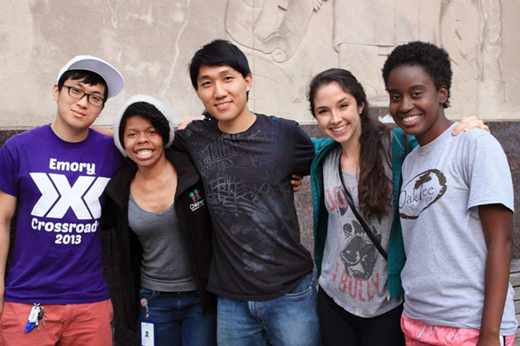For the past three years, Emory's Office of Health Promotion has been laying the groundwork to help reshape that thinking with the development of Flourish Emory, a wide-reaching program that aims to expand definitions of student success, embrace wellness and influence Emory culture.
"We're looking at health as a comprehensive quality that lets a person achieve their full potential," says Heather Zesiger, director of the Office of Health Promotion. "It's not all about working until you drop, it's about embracing resiliency and coping and recognizing that there are resources to help."
Last year marked the soft launch of Flourish Emory — an outgrowth of Emory's Healthy Campus Initiative — with pilot events that included:
- Happiness Bootcamp: A six-week program that strives to change campus culture by introducing positive psychology concepts grounded in research.
- The Good Life Lecture Series: Emory faculty provide expertise and facilitate conversation on how to lead "the good life" based upon Aristotle's concept of eudemonia (well-being and fulfillment from a sense of purpose), co-sponsored by Vision to Action and the Emory Center for Ethics.
- B+ (Be Positive): A series of activities and workshops aimed at helping students develop skills to cope with stress, lead happier lives and achieve their full potential.
Those programs will expand this academic year, as Flourish Emory partners with the Office of Residence Life and Housing and Emory Cares 4 U to introduce a new sophomore residential learning experience — a living/learning environment focused on flourishing.
As a part of that experience, Harris Hall residents will be offered a voluntary nine-week training program to engage in activities that encourage self-care and well-being, Cordon says.
The program is funded through a $10,000 matching grant awarded to Emory by Bringing Theory to Practice, a project that supports campus-based initiatives that advance the education and well-being of students, offered in partnership with the Association of American Colleges and Universities and funded by the Charles Engelhard Foundation through the S. Engelhard Center.
The grant application, spearheaded by Emory College senior Audry Klossner, was grounded in the research of Emory sociologist Corey Keyes, Winship Distinguished Research Professor, a pioneer in positive psychology who is regarded as one of the "fathers of the 'flourishing' field," Zesiger says.
'Seeking a more balanced life'
Keyes, who teaches about the science and sociology of happiness and has helped advise Flourish Emory, says the time is ripe for campus-based programs that strive to create a more positive, flourishing culture for college students.
"Research shows that flourishing reduces the risk of mental illness such as depression, and the risk increases dramatically as people shift away from flourishing," he says.
Given that more students are arriving on U.S. college campuses grappling with stress, depression and anxiety, "we can also argue that promoting flourishing protects against relapse," he adds.
Keyes utilizes the word "flourishing" to describe mentally healthy adults who enjoy high levels of emotional well-being in their lives. Research also indicates those who are flourishing experience fewer health problems, miss fewer days of work,
experience greater productivity and creativity, and feel a sense of purpose, he notes.
"I believe students themselves are recognizing a bit of a void around issues of happiness, well-being and quality of life and are actively seeking a more balanced life of meaning and contribution," says Keyes, who speaks widely on the topic and has recently launched a consulting business dedicated to flourishing.
Consider Courtni Andrews among the converted. She participated in a six-week Happiness Bootcamp program this past spring and found it "probably one of the best experiences I've had on campus as an Emory student."
"I consider myself to be a very happy person, but the experience has helped me flourish in ways I couldn't imagine," says Andrews, a rising senior majoring in neuroscience and psychology. "I've gotten to a better place."

